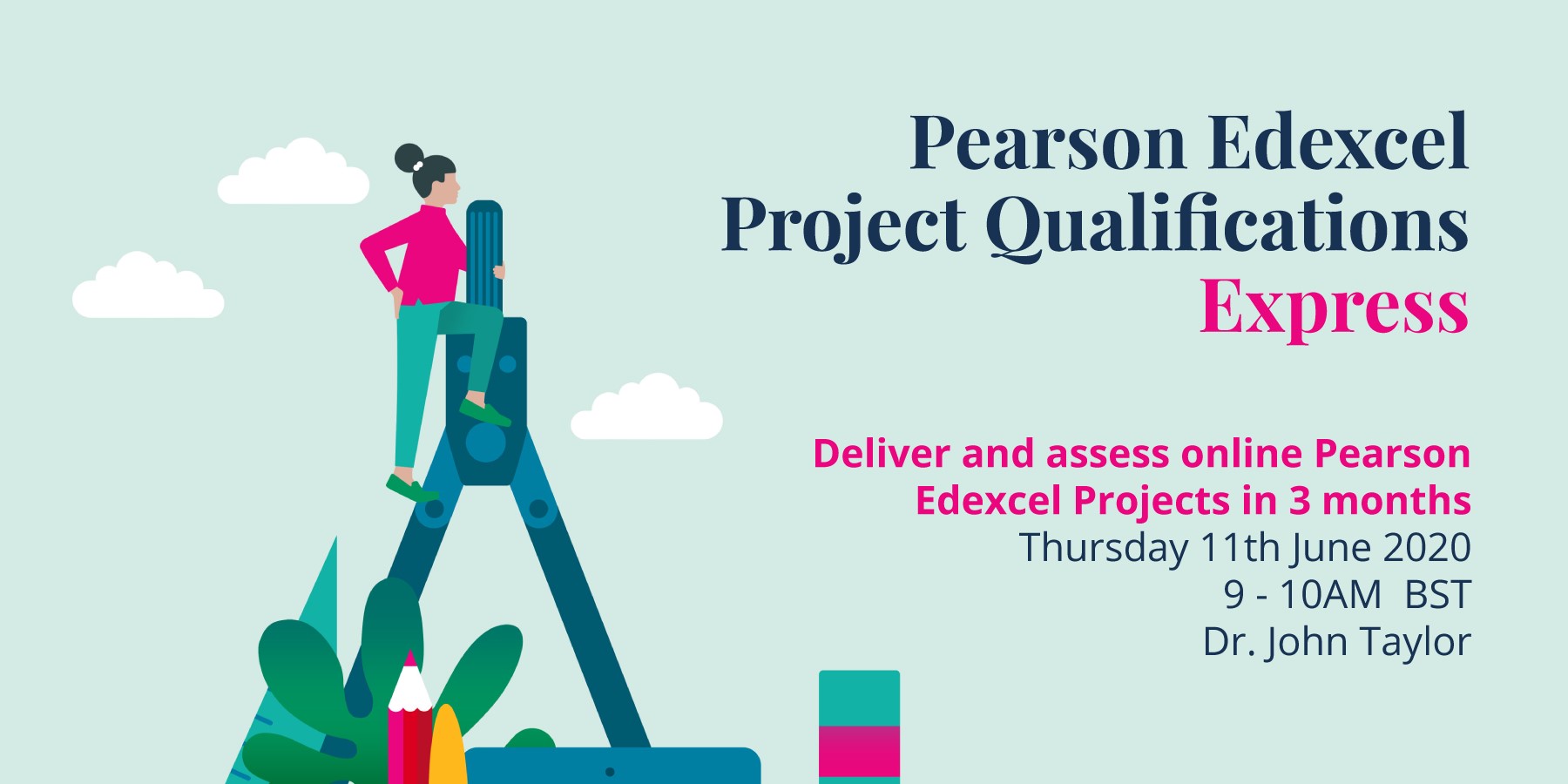
We are teaching online. Exams have gone by the wayside and we have a great opportunity to do more project work with students. There is a natural fit between project learning and online learning; to make online learning work, we need to trust our students to manage the learning process more independently. Project work is a great means by which students can develop their skills as independent learners.
So what do we mean by project work? Essentially a project is a personal response to an open question or challenge that unfolds over time, usually through a process of planning, research, development and review.
Fundamentally project work is based on two principles: giving learners freedom to choose their own questions or challenges, and giving them time to develop their own response to these questions or challenges.
Let’s begin with the point about freedom of choice.
Give students freedom to choose their own questions or challenges
Learning is more engaging, more meaningful and more effective when it begins with questions that learners choose for themselves.
Most learners are studying from home. So now, more than ever, learning can and should begin in their world – with their questions, their interests and their challenges.
Children learn best when we find a way of connecting the topics and skills that we want them to learn to the world they already inhabit. It isn’t exactly rocket science: we learn better when we’re interested. Engaged learning is effective learning.
Of course, we still have a curriculum that needs to be taught. But even when the topics are prescribed, we can let students choose how they engage with the material. I’m teaching my year 9 students about energy and I’ve used a set of small scale projects based on going around their homes, analysing energy transfer through household appliances and working out what they could do to save energy. I let them choose how to present their research, through a document, a slideshow or a film.
Set extended project assignments
Secondly, the learning process is richer and deeper when we allow activities to develop over a significant period of time – a week, a month, a term or even a full year.
We are discovering that online learning works more smoothly if we give students more control over how they use their time. In terminology we’re all becoming familiar with, online learning needs to make use of asynchronous activities as well as synchronous tasks. Learners are accessing lessons across a variety of platforms and at different times of the day. We need to let them take more control over when and for how long they work. Project work gives them the freedom to progress at their own pace and in their own time. They aren’t all locked into a system where they have to complete and submit the same assignments all at the same time.
Now you may be someone who routinely does this for your students. If so, you are unusual. An OECD study found that less than 30% of teachers frequently or always set projects that take more than one week to complete. In fact, this teaching practice is the least common of those which the OECD surveyed.
We need to move from lessons dominated by worksheets and quizzes to lessons which form part of a project learning process that spans a week or more and where students have the freedom to choose how they use their time. Synchronous task setting and assessment isn’t viable for teachers in terms of workload and it isn’t meaningful for learners who may be working in isolation from meaningful sources of support
So there’s a long way to go. But now is a great time to get moving.
Where do we start?
Projects learning begins with teaching students the skills they need to go on to be able to engage with questions and challenges of their own choosing. It involves selection of personally meaningful objectives, research, creative development and review. It means that the teacher occupies the role of a mentor, facilitating the learning process, helping to equip the learner with the skills and scaffolding for the learning process that they need in order to begin their own journeys of creative discovery
1. Give learners freedom to choose
Many of us have had to face the challenge of giving a meaningful end to the academic year for learners whose exams have been cancelled.
At the school where I work we decided to give our year 11 students an opportunity to work on a fast-track EPQ. Can they take a topic that has excited their interest or which links to their hopes for future work or study and start to turn it into an extended project?
The teaching is delivered through an online platform with a stream of videos providing guidance on skills like referencing, finding sources or creating a plan of research. Staff who would have been teaching exam groups have been asked to be mentors and make contact with them via an email or online meeting to supervise progress.
They have responded enthusiastically. They appreciate having a new challenge and are relishing the independence they have been given to choose their own questions for research, as well as the chance to experience a taste of what sixth form learning will be like.
2. Embrace open-ended questions
We are living in a period where the question ‘what do I need to know for the test?’ couldn’t be more obviously the wrong question to ask. We all know that we need to get away from the pressure of teaching to the test – and now, for a time at least, there is a unique opportunity to explore a different mode of learning.
The key to this is asking open questions – questions with no obvious right answer. The very sort of question that exams tend not to contain, because they are virtually impossible to reduce to mark scheme acceptable answers. Successful projects begin from open questions – questions that call for real research, inquiry and investigation. When there is no obvious right answer, we have to begin to think; we have to learn to evaluate, to weigh up the evidence favouring alternative interpretations, and to look at the possibility of creative synthesis of differing positions.
3. Use the tools of education technology to make progress visible
Project learning means letting go of the reins and giving students independence. But then, how will we know if they are making progress?
The tools of education technology come in here to enable mentors to track and trace progress. Even in remote learning, you can still be a close observer, and mentor, in the learning process. Facilities like shared documents and version histories are enormously powerful tools. Learners may be physically distant but digitally close. We can come alongside online with questions, suggestions and encouragement.
I’ve found that sometimes, running a tutorial online is more effective, because the learner is in their own space at home, and this can give them confidence to reach out and start up a conversation which they might not have felt able to start in the middle of a classroom.
4. Teach students the skills they will need
When employers are asked about the workplace skills they look for, they regularly put qualities like Decision making, active learning and originality high on the list. Projects help build these skills, which is why project learning is the single best way of becoming ‘future ready’.
Most of us don’t do many exams once we leave formal education; almost all of us have to work at challenges that require creativity, collaboration and critical thinking, not to mention teamwork and persistent development over a sustained period of time.
By equipping learners to shape their own questions, to learn skills in research and analysis processes of creative thinking and critical evaluation, we are preparing them with the toolkit of skills they will need for life and work in the future.
It is worth pointing out that these skills need to be taught. Encouraging students to become independent learners does not mean leaving them to work it all out for themselves. We need to teach them to be independent. A successful project programme will build in opportunities for students to be taught how to frame appropriate research questions, how to analyse and evaluate sources and how to use argument and counter-argument to develop and defend their ideas.
Increasingly, it is on digital platforms that teachers and learners interact which is why, on the Pearson Future Ready website we’ve included a free toolkit for moving Project Learning online, resources for project mentors and students as well as designed programme for using EPQ to teach employability.
So – we’ve been suggesting that project work has a lot to offer as we look to make a success of the move to online learning. The key steps to a successful project programme are
- Give learners freedom to choose
- Embrace open-ended questions
- Use the tools of education technology to make progress visible
- Teach students the skills they need
We hope through this short introduction you will appreciate that project learning and online learning fit together like a hand in a glove. We hope as well that we’ve been able to convey some of our enthusiasm and excitement about the opportunity that we now have to offer our students something new and different and highly valuable both now and for the future.
Watch the webinar: Deliver and assess online Pearson Edexcel Projects in 3 months
Recorded Thursday 11 June 9:00 BST | Watch on demand

With the closure of schools worldwide leading to a rise in online teaching, interest in online project-based learning is also increasing.
A fast-track Pearson Edexcel Project Qualifications Express creates an unprecedented opportunity to help your students stay motivated and engaged during lockdown. In this free webinar with Dr John Taylor, Chief Examiner of the Extended Project Qualification, you will learn how to deliver and assess online Pearson Edexcel Projects in three months as he:
- Outlines the new Express approach to deliver level 1, 2 and 3 project qualification and how to move project provision online
- Discusses the principles of project mentoring for teachers new to this approach or those wanting to refresh their mentoring skills
- Showcases the new free project-learning and qualification support resources.
Read the FAQs: Pearson Edexcel Project Qualifications
Q: How do Edexcel Project Qualifications help learners?
A Pearson Edexcel Project Qualification:
- gives learners the freedom and responsibility to choose what they want to learn
- ignites their curiosity with an opportunity to explore something they are really interested in
- prepares them better for university with independent thinking skills
- allows them to gain an additional qualification which, depending on level, attracts UCAS points for university.
Q: What is the expected age of students for the L1, L2 and L3 Pearson Edexcel Project Qualifications?
This is at the discretion of the centre to decide what is appropriate given the level of their learners, but typically FPQ / HPQ is taken at Level 2 (typically 13 to 16 year-olds) and EPQ is taken at Level 3 (usually 16 to 18-year-olds).
Q: If a student has already done a research project can they use it for a Pearson Edexcel Project Qualification?
It may be that work would have to be re-written to fit within the expectations of the Edexcel project framework, but knowledge gained from research done for another task can be used provided that the material submitted has not been used for another qualification.
Q: Can a student do more than one project?
Only one project can be entered in any given awarding cycle, but it is possible to do more than one using different awarding cycles for entry.
Q: Can students work in groups for the same project qualification?
Yes, provided each group member participates in all the stages of the project and has recorded their contribution for individual assessment.
Q: If this is internally assessed, how does Pearson Edexcel control the quality?
A team of trained external moderators review work.
Q: Are there any online resources and teacher training to be able to deliver project qualifications during summertime?
Yes, resources are available on the Pearson Future Ready website – take a look at the Express Qualification pages where you’ll find more information including an EPQ Online Toolkit and mentor guidance. Also see our further resources in our Future skills for employability pages. Pre-recorded training is also available now on the Training from Pearson website.
Q: Are there points given for this qualification towards university applications?
Yes, the Level 3 EPQ attracts UCAS points equivalent to a half A Level (e.g. up to a maximum of 28 points for A*).

